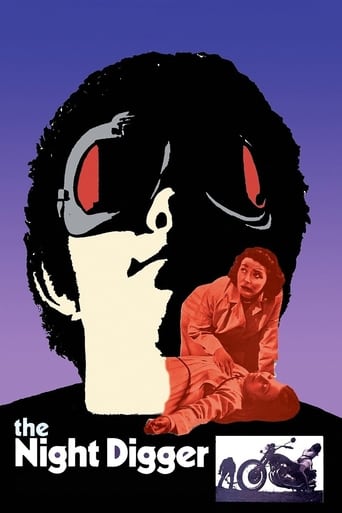lost-in-limbo
I'm surprised that this particular film isn't as well known, as "The Night Digger" is an effectively expressive British psychological thriller (penned by Roald Dahl) with a touch of Gothic drama, psycho-sexual unease and sinister moods. The performances of the cast do go a long way to carrying the intrigue and ambiance, where Patricia Neal, Pamela Brown and a very brooding Nicholas Clay do an outstanding job. Neal's repressed turn really is one of great strength and emotion, while Brown authentically commands the screen as the demanding, disabled mother. Clay has a charm about him, but lurking underneath is something unsettling. The relationship that slowly builds between Neal and Clay's characters is affecting, that when she becomes suspicious of him, due to the disappearances of young woman in the area. She just doesn't want to believe he has anything to do with it, despite knowing he surely does. She yearned for something meaningful, and that was him as he brings out the confidence in her and of course she loves the man. So they run away together. The moments when she finally confronts him over it, while terse it remains powerful. Even the sequences with Neal and Brown (adopted daughter and mother) crafted out gripping exchanges. The scenes involving the murders or even the lead up to them (where he torments the victim) are truly creepy, and Bernard Herrmann's subtle, but tense score paints it nicely. This is set-up in an remote country mansion within a small rural town, so town gossip features prominently and is somewhat a driving force for some key plot progressions. So is the loneliness of Neal's frustrated character, which Clay's character takes advantage of and so does Brown's. The pacing is causal, but it helps the atmosphere build and lets the character's form shape.
lazarillo
As others have said, this movie was written by British poet/author Roald Dahl as a vehicle for his wife, American actress Patricia Neal. (I thought of it recently after seeing a similar American movie "Happy Mother's Day, Love George" that featured Neal and the couple's real-life daughter Tess Dahl). The basic story is pretty good. Neal plays a lonely spinster whose domineering mother rents a room to a traveling road worker (Nicholas Clay), and Neal's character finds herself drawn to the handsome, younger man, unaware that he might be a serial killer who has buried a string of female victims along the road he is building. . .This definitely works as a vehicle for Neal, who is probably most famous for the Paul Newman movie "Hud" (even though her character in that was supposed to have been African-American, but such a thing would have simply been too incendiary in the early 1960's). She is very good in this. Unfortunately, she doesn't get a lot of help. Nicholas Clay would later play Lancelot in "Excalibur" and appear with an all-star cast in Agatha Christie's "Evil Under the Sun", but he was just too inexperienced here. For whatever reason, there was a plethora of handsome but psychotic young men in British movies at this time, and this role might have been better played by another "handsome young psycho" actor like Shane Bryant or Hywell Bennett (although neither of them might have been very convincing as a roughneck construction worker). If it have been made a decade or so earlier though, it would have been a PERFECT role for a young Oliver Reed.The directing is also a little flat generally, but the first murder (following a motorcycle ride) is pretty inspired. The Bernard Hermann score is not one of his best, but it does add SOMETHING to the proceedings. This isn't great, but it certainly deserves to be more widely seen.
James Hitchcock
In Britain "The Night Digger" is shown from time to time on TCM, normally late at night, under the alternative title "The Road Builder". It is not, however, a particularly well-known film, even though the script is by one of Britain's best-known writers (Roald Dahl) and it stars an Oscar-winning actress (Dahl's wife Patricia Neal).Neal plays Maura Prince, a middle-aged spinster living in the English town of Windsor with her mother Edith. Several years earlier Maura suffered a serious stroke, which left her temporarily paralysed, although she has now recovered and works as a therapist helping other stroke victims. (Dahl inserted this as an obvious reference to the fact that Neal had herself suffered such a stroke in 1965). Maura is finding it difficult to cope with the demands of looking after her elderly mother and maintaining their large Victorian Gothic house, obviously once luxurious but now run down and dilapidated.Their lives are changed when they hire a young man named Billy as a handyman. Billy is a road-builder working on a new motorway which is being built in the area. (The motorway runs from Liverpool to London via Manchester, Birmingham, Oxford, Reading and Windsor. In reality no single motorway has ever been built along this route, although the southern part of the route corresponds roughly to the M40, which did not exist in 1971, not being completed until 1988).Billy claims that his surname is Jarvis and that he is originally from Cheshire (in north-west England), which causes Edith to claim him as a long-lost relative as she has family with that surname in that county. (Billy's accent, however, is a south-eastern one, which must cast some doubt on his claim; he may have discovered Edith's family background and invented a story to deceive her). At first he seems to be a godsend to Edith and Maura; he is polite, friendly, helpful and a competent worker whose efforts soon have the dilapidated house and overgrown garden looking smarter. Billy, however, may be hiding a dreadful secret. A young woman from the area is found murdered, and the police attribute the crime to a serial killer who has taken the lives of several other women in different parts of the country. Ominously, the other killings took place in Liverpool, Manchester, Birmingham, Oxford and Reading- the cities close to which Billy was previously working on the new motorway. There is, however, a further complication in that Maura- previously a dutiful daughter obedient to every whim of her domineering mother- finds herself becoming attracted to the handsome young man.The plot is not always satisfactory, and the ending, after Maura and Billy have run away to the Scottish Highlands together, is particularly enigmatic. (This is surprising given that Dahl was a gifted short story writer whose stories normally ended with a satisfying twist). Although it is clear to the audience that Billy is indeed a killer (and there is an attempt to explain psychologically why he became one), we are never sure how much Maura knows or suspects about his guilt. Is she convinced of his innocence, or is she closing her eyes to the obvious. Or does she know all along that he is guilty? Our view of Maura depends very much upon the answers to these questions, so it is surprising that they are never definitely answered. Perhaps Dahl felt it made for a more satisfactory film to keep us guessing. (The title "The Night Digger" refers to Billy's habit of disposing of his victims at night, by burying them under the motorway workings. The plot has many similarities to that of another British film from a few years earlier, "Night Must Fall", which also regularly appears on TCM, and which also features a mother and daughter living together and a psychopathic handyman. "Night Must Fall" (a remake of a 1937 American film with the same title, which I have never seen) is a rather dull film with one of Albert Finney's weakest performances at its centre. "The Night Digger", although it has its weaknesses, is an altogether better film.Rather surprisingly for a winner of the "Best Actress" award, Neal never really became a household name, certainly not when compared to other "Best Actress" winners from the sixties such as Elizabeth Taylor, Sophia Loren and Katharine Hepburn. Her performance here, however, shows just how good she can be as the sexually repressed spinster dominated and emotionally manipulated by her mother. Although we may suspect that she is knowingly covering up for a murderer, we always retain some sympathy for her. Pamela Brown is also good as the terrifying Edith, even though she was really too young for the role, being only nine years older than Neal.Besides the acting, "The Night Digger" is also notable for its brooding, mysterious feel. Even without the macabre nature of the story, the photography of the damp, autumnal English countryside and the decaying, Gothic mansion, aided by the score from Hitchcock's favourite composer Bernard Herrman, would be enough to conjure up a sense of nameless dread. Director Alastair Reid was no Hitchcock (he worked mainly in television, and only made a few feature films) but he brings a few atmospheric touches to this film. His use of unusual, oblique camera angles and his technique of concentrating on only a part of a speaker's face (normally the eyes or mouth) add to the general strange and unsettling atmosphere of this film. Despite the obscurity into which it has fallen, "The Night Digger" is a tense thriller and character-study which it is worth staying up late to see. 6/10
cartman_1337
Roald Dahl has always been a good story-teller, and this movie, for which he wrote the screenplay, is no exception. It's a macabre love story with a somewhat unexpected ending. Very good acting and story-telling. I recommend this film for all Roald Dahl fans. 7/10.



 AD
AD




